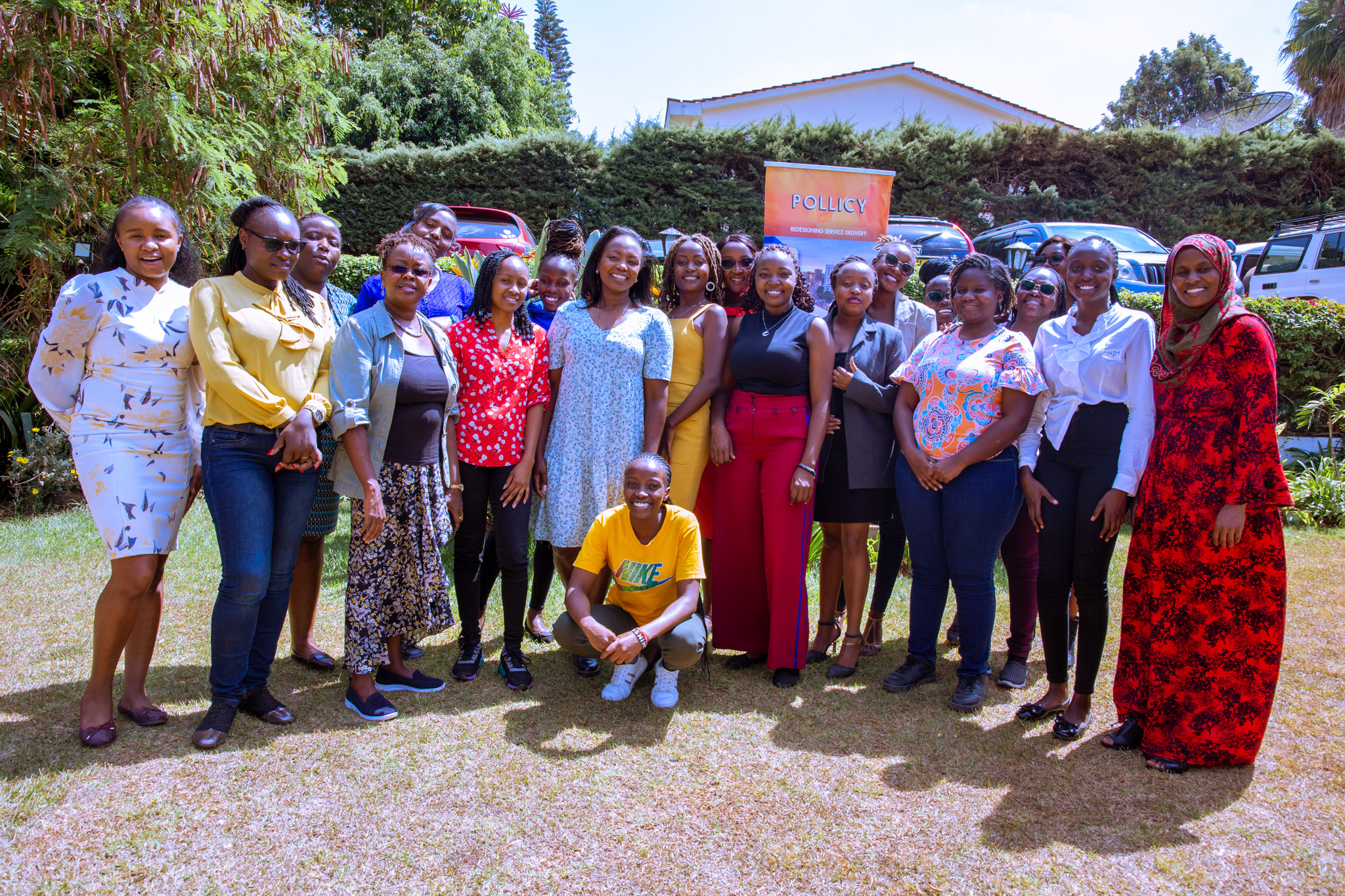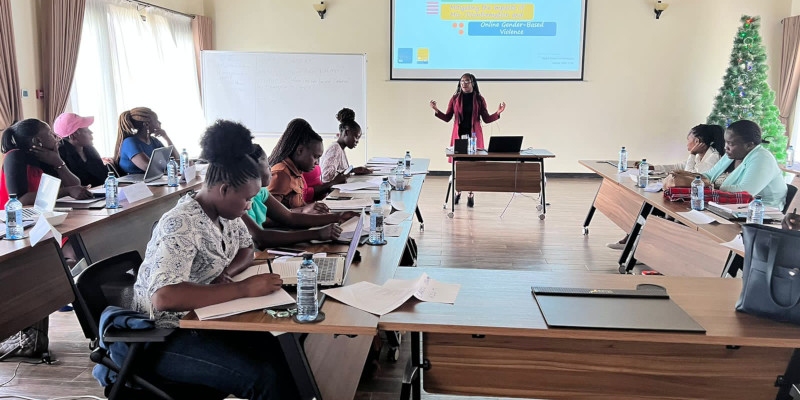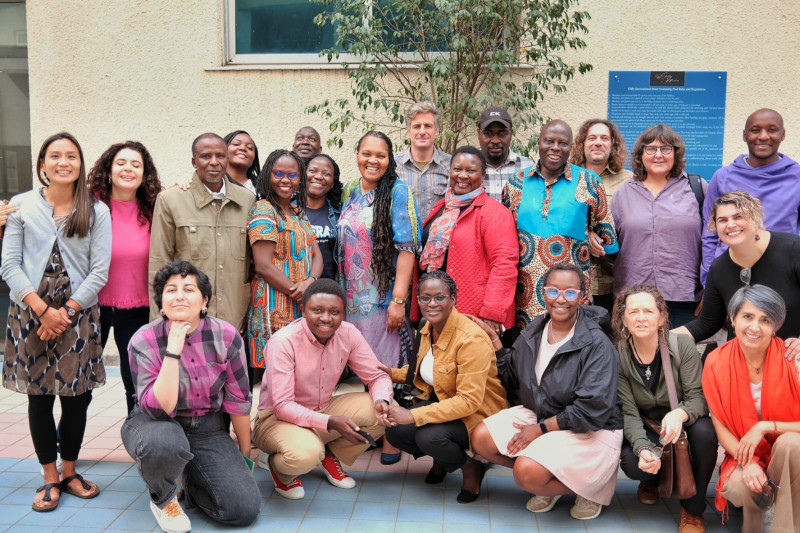In a two-day externship run by Pollicy with the confederacy of the International Association of Women in Radio and Television—Kenya (IAWRT Kenya) and Association of Media Women in Kenya (AMWIK), women journalists have been urged to become the non-toxic, positive change they wish to see in the online spaces. This training, dubbed ‘Future of Work,” concentrated on disseminating useful knowledge on the possible scenarios of the future of work for journalists as well as how digitization may affect online communities. It has been observed that online gender-based violence has become a normalized trend, and the ripple effects of it have caused unimaginable harm to the victims. OGBV, especially against women, hampers the realization of gender equality and violates human rights. It is therefore our individual responsibility to create safe and enabling online spaces, especially for women. Speaking during the training, Cecilia Maundu, a staunch activist against online-based violence and a digital security expert and mentor, encouraged all not to shy away from social media but to responsibly and cautiously use their platforms to promote the social good. “As we steadily move into the digital world, do not be scared of social media. Just be cautious as you interact with it,” she urged. In most progressive countries, gendered disinformation has become a grievous issue that has largely paralyzed the seamless progression and advancement, especially of women with higher public profiles and those in positions of authority. ‘For journalists, gendered disinformation campaigns are especially effective when combined with other forms of attacks, such as online abuse and harassment, which aim at silencing their voice in public.’ Said Grace Githaiga, Internet Governance and Tech Policy Thought Leader at KICTANet. She went further to encourage women journalists to remain unruffled and keep their heads up in pursuit of their careers despite the challenges and online attacks that are likely to befall them. Responsively, victims of gendered disinformation and other forms of OGBV have been advised to use various protection and guide mechanisms to conquer the negative and overwhelming impacts that may arise from them. Such included the use of online harassment manuals, self-validation, guidance and counseling, and attending gender-responsive training offered both online and offline. To inform the populace about existing and emerging digital safety issues, Pollicy encouraged all to play the ‘Digital Safe tea” game hosted on their official website. Digital Safety is an interactive fiction game based on the stories of young African women that present scenarios to learn about existing and emerging digital safety issues. As the world prepares to mark this year’s International Women’s Day, all social media users are encouraged to become the safe and non-toxic change they wish to see on the platforms. Digital safety starts at the individual level. IAWRT Kenya is a global nonprofit professional organization of women working in electronic, Technology, and allied media. IAWRT Kenya has over 2000 members spread across media houses and other like-minded organizations. IAWRT strives to support the professional development of members through the exchange of ideas, experiences, and technical knowledge. It also strives to meet urgent global challenges faced by women in and around the media industry. By, Raylenne Kambua
Women and Technology: Amplify women’s voices in the community, through the media.
Misleading and incorrect information is becoming dangerous, especially in this era of social media. The objective of sending out such information is to deceive and influence people in a targeted direction deliberately. Unfortunately, the most affected are women. Speaking in Bungoma during the Bungoma and Kakamega Counties female journalists training, Kenya ICT Action Network (KICTANet) CEO & Convenor Grace Githaiga said disinformation is becoming rampant in Kenya with the intention to change the public’s perception towards women as well as to deter women from pursuing careers in politics and leadership positions. Ms. Githaiga says gendered disinformation in the online space has increased and has amplified violence against women giving examples of how women are bullied on social media platforms. “Disinformation has undermined human rights and many elements of good quality democracy. It also threatens freedom of thought, association, the right to privacy, and the right to democratic participation,” she explained. Githaiga who is also a host and Moderator on the Take on Tech program, a Weekly TV Talkshow at Kenya Broadcasting Corporation (KBC) urged journalists to write more stories that depict women as inspiring thinkers and powerful leaders because this will help foster a culture of women and girls empowerment. The media is critical in helping stop retrogressive cultural gender norms and stereotypes. “The media perpetuates and reinforces gender inequality when it fails to portray women as equals and stereotypes them in their professions, social roles, and personal characteristics,” she added. Neema Mujesia from KICTANet echoed Githaiga’s sentiments saying the public tends to believe false information as it spreads faster and that there’s a need for the media to curb this through using a Digital Enquirers kit for safer, more credible, and inclusive information and communication. Mujesia says the kit will help journalists to identify and respond to misinformation, disinformation, and mal-information as well as verify online information. On the other hand, Racheal Nakitare who is the Assistant Television Programmes Manager, at Kenya Broadcasting Corporation (KBC) says the technology sector is growing steadily and the scant presence of women doesn’t just represent a lost opportunity for them but for society as a whole. Nakitare who also doubles up as a trainer and Projects Coordinator at The International Association of Women in Radio and Television (IAWRT) Kenya, insists on the need for journalists to amplify women’s voices in the community by giving them visibility through the media. “Greater diversity at work would provide a global and more accurate view of the major challenges our society faces. If women are left out, not only will the gender gap and inequality continue to grow but it will also be harder for us to address and overcome issues related to equality and economic and social problems. As journalists we must put in more effort by focusing on and publishing women-related stories,” said Nakitare. IAWRT Kenya carried out the training for women journalists In Bungoma and Kakamega counties with support from the Association of Progressive Communications (APC). It aims to enhance the skills of women journalists in the uptake and use of technology in their day-to-day journalistic work. By Brenda Imai
Gender, Justice & Freedom of Expression
“For the freedom of Expression to be preserved, there is a need to look deeply into and tackle the deliberate misogyny and hate speech that is fast manifesting through gender misinformation” this is according to Ms. Irene Khan, Special Rapporteur on the Promotion and Protection of the Rights to Freedom of Opinion and Expression. Speaking during the APC members’ consultative meeting, Ms. Khan emphasized the need to contextualize such attacks, build resilience in communities to identify and counter those attacks and pay greater attention to internet companies whose objective is rooted in profit making, oblivious of the unintentional destruction caused to human lives. The Association for Progressive Communication (APC) members in Africa held a consultative meeting on the sidelines of the 17th Internet Governance Forum (IGF) that took place in Addis Ababa, Ethiopia between 28th November and 2nd December 2022. The overarching theme for the 17IGF was “Resilient Internet for a Shared Sustainable and Common Future” The team explored ways of addressing online gender-based violence (OGBV) alongside other thematic areas identified as key by APC https://www.apc.org/en/pubs/apc-priorities-2022- during the Internet Governance Forum. LANGUAGE During the meeting it came out that in responding to increased cybercrime and online attacks, many African countries have enacted requisite laws to contain rising cases. However, the language contained in the various laws focuses more on the medium used than the victims. For example, Kenya’s Computer Misuse and Cybercrimes Act do not give a clear definition of Online Gender Based Violence-OGBV and how the law will be enforced. – instead, it focuses on electronic gadgets that are used to commit the crime. The same applies to the amendment bill before Parliament that seeks to equip law enforcement agencies with legal and forensic tools to tackle cybercrime. During deliberations at the Addis meeting, the Africa Commission on Human and Peoples’ rights Resolution 522 was cited as one of the documents that come close to giving clear and practical definitions to OGBV including redress mechanisms. GENDER DISINFORMATION Gender disinformation is a form of violence against women that is coordinated and robes women of their dignity and humanity. The attacks are often stereotypical and misogynistic to deliberately intimidate women and silence the critical voices of women. Women journalists and politicians are among those who have been targeted, through gender disinformation on various online platforms. The technology used in such platforms often shields perpetrators who use pseudonyms and as such remain anonymous. Simultaneous and direct feedback compounds the attacks that sometimes attract an online army that amplify the attack on various online platforms RESPONSIBILITY The responsibility to protect the freedom of expression lies with governments through the enactment of laws that ensure safe use of available spaces. This can only be achieved if governments prioritize internet use as a public good with its use harmonized to reflect national and human values. Civil society organizations like IAWRT Kenya (https://iawrt.or.ke/2022/09/28/capacity-building/) which are working closely with other APC partners have identified the gaps in digital literacy and mounted digital safety training for women journalists and female journalism students in public universities in Kenya. Anriette Esterhuysen, an APC Associate recommends a people-centered, bottom up and impactful approach that compels internet companies to harmonize their roles to reflect human values. Sadly, monetization of digital platforms is still riding on dehumanizing women through online gender disinformation. There is therefore urgent and deliberate need to embed safety and security features in the software that runs on various online platforms in order to shield women from online attacks. Blog by @nakitare
IAWRT AT the IGF 2022
More to follow.




